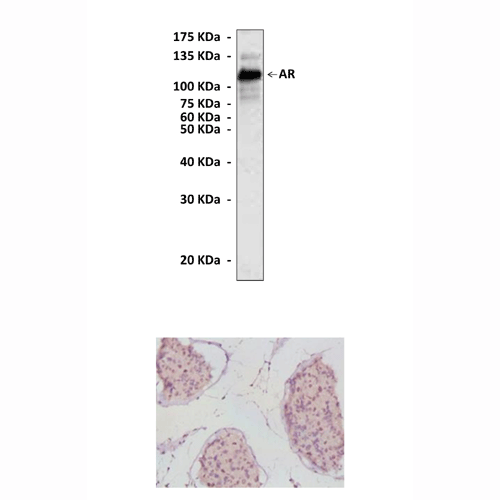Anti-Androgen Receptor: Mouse Androgen Receptor Antibody |
 |
BACKGROUND Androgen Receptors (ARs) (also known as dihydrotestosterone receptors) are nuclear hormone receptors of the NR3C class, which also includes mineralocorticoid, progesterone and glucocorticoid receptors. They are expressed in bone marrow, mammary gland, prostate, testicular and muscle tissues where they exist as dimers coupled to Hsp90 and HMGB proteins, which are shed upon ligand binding. Androgen Receptor has 3 major functional domains: the N-terminal domain, DNA-binding domain, and androgen-binding domain. The protein functions as a steroid-hormone activated transcription factor. Upon binding the hormone ligand, the receptor dissociates from accessory proteins, translocates into the nucleus, dimerizes, and binds to nuclear response elements of the genome, with an inverted palindromic 15 nucleotide sequence, to regulate gene transcription. Transcription factor activity of Androgen Receptor is modulated by bound coactivator and corepressor proteins.1 Transcription activation is down-regulated by NR0B2. Activated, but not phosphorylated, by HIPK3.2 Androgen receptors also effect gene expression through interaction with transcription factors including AP-1, NF-kappaB and STAT. Target genes of androgen receptors include insulin-like growth factor 1 (IGF-1) and genes involved in the development of primary and secondary male sexual characteristics, maintenance of sexual function and possibly have a causative role in aggressive behavior.3 Furthermore, androgen receptors have recently been shown to have actions that are independent of DNA interactions. Congential mutations in androgen receptors are associated with androgen insensitivity syndromes, virility and spinal and bulbar muscular atrophy. A perturbation in androgen receptor expression is also a common feature of prostate cancer.4 The human gene encoding the androgen receptor has been localized to Xq11-12.
REFERENCES
1. Lee, H.J. & Chang, C,: Cell. Mol. Life Sci. 60:1613-22, 2004
2. Cronauer, M.V. et al: Int. J. Oncol. 23:1095-102, 2003
3. Fronsdal, K. et al: J. Biol.Chem. 273:31853-9, 1998
4. Visakorpi, T. et al: Nature Genet. 9:401-4, 1995
2. Cronauer, M.V. et al: Int. J. Oncol. 23:1095-102, 2003
3. Fronsdal, K. et al: J. Biol.Chem. 273:31853-9, 1998
4. Visakorpi, T. et al: Nature Genet. 9:401-4, 1995
Products are for research use only. They are not intended for human, animal, or diagnostic applications.
Параметры
Cat.No.: | CP10279 |
Antigen: | Raised against recombinant human Androgen Receptor fragments expressed in E. coli. |
Isotype: | Mouse IgG1 |
Species & predicted species cross- reactivity ( ): | Human |
Applications & Suggested starting dilutions:* | WB 1:1000 IP 1:50 IHC 1:50 - 1:200 ICC n/d FACS n/d |
Predicted Molecular Weight of protein: | 110 kDa |
Specificity/Sensitivity: | Detects endogenous Androgen Receptor proteins without cross-reactivity with other family members. |
Storage: | Store at -20°C, 4°C for frequent use. Avoid repeated freeze-thaw cycles. |
*Optimal working dilutions must be determined by end user.
Документы
Информация представлена исключительно в ознакомительных целях и ни при каких условиях не является публичной офертой








